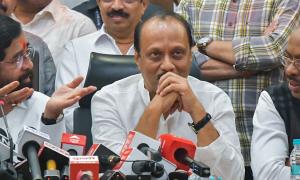At one point, Warner Brother constructed an enormous storage room to stock the many scripts commissioned, revised, rejected since 1995, when producer Jon Peters got out of 'what if' mode and began making serious attempts at a Superman revival.
Okay, just joking -- but there were in fact enough scripts to stock a fair-sized storeroom before Michael Dougherty and Dan Harris teamed with director Bryan Singer to pull it off.
Dougherty is a graduate of the New York University film programme; Harris has a Bachelor's from Columbia University.
The two have a history of working well together -- their previous credits include X2: X-Men United (2003), also directed by Bryan Singer. That screenplay earned Dougherty a place in Variety magazine's list of top 100 screenwriters to watch.
Their future projects include an adaptation of the best-selling Glen Duncan novel I, Lucifer, which Harris (who made his directorial debut in the recent Sigourney Weaver-Jeff Daniels-starrer Imaginary Heroes, which premiered at the Toronto International Film Festival last year) is slated to direct, and Trick or Treat, which Singer will produce and Dougherty will direct.
Dougherty, an accomplished illustrator with a string of award-winning animated films to his credit, and Harris are slated to collaborate with Singer in writing a year's worth of Ultimate X-Men comic books and Superman Returns comic books. We decided to ask them a little more...
The Superman revival has been tossed around the Warner Brothers lot like a decade-long game of pass the pillow -- how did you guys end up with it?
Harris: We had just finished X-Men 2 and this project was being whispered about even then. Warner was looking for a new director for Superman, and by then it was the J J Abrams (the man behind the television series, Alias and Lost and the director of Mission Impossible 3) script. They were also toying with a Batman versus Superman.
Someone at Warner Brothers was talking to Bryan Singer and he wasn't taking it too seriously at the time, but he did pull me aside once and said it would be neat to do a Superman movie -- an off the cuff kind of thing.
That is where we first pitched the idea of a sequel to the Richard Donner film (Superman: The Movie, 1978). It was more about what would happen if Superman went missing, and then came back. But it was a tenuous conversation. That was in May 2003. That summer, the week after X-Men 2 came out, we went with Bryan to Hawaii for the first time, on vacation, and he had the J J Abrams script.
Dougherty: He read it on the plane but he wouldn't let us read it. He realised the script they had was a kind of remake, which wasn't what he believed in or wanted to do. Then, a year later, we were back in Hawaii for another vacation, when it came out for real that was kind of an opportunity -- a sort of crossroads for Bryan that involved us too.
We could either do X-Men 3, which by then had a crunch schedule, and there was Logan's Run, which we had been developing for four or five months at the time, or this new Superman, because the director they had had fallen out.
So, he threw this idea at us, and we went crazy on it for about three days. By the time the trip was over, we had the idea for almost the entire movie in the bag.
Why base it on the 1978 Donner film? Why not recast the entire mythology, as you were making it after such a long passage of time?
Harris: It was partly because we felt that the original film is the origin. When you think of making a James Bond film, you don't go back to square one every single time and retell his origin.
Dougherty: Sometimes you should, sometimes you shouldn't -- we felt that Donner had done it in a way that was really classic. Also, we believe you shouldn't remake something just because it is old -- these days, films have a longer lifespan because of DVD, and this film in particular has a longer lifespan than most.
George Lucas doesn't go back and remake Star Wars, he makes additional chapters.
Harris: Also, at the same time, we had things on television like Smallville, which were rewriting the origin. If we got into a third version of that, it would get confusing for people who want to identify with the character and the story, a familiar one they can rest their shoulders on.
In Superman Returns, you have him go missing for five years -- does that time help give you some rope to develop the character in some particular direction?
Dougherty: To me, it was like he had been gone from the fictional universe, and also from the real world. I think it helps audiences connect immediately -- within the story, which is about his return to earth, it is also his return to the big screen. In a way, I'd call this a second origin, in that he is being reintroduced to the audience, which is why the movie takes the trouble to reintroduce the Daily Planet, the Kent farm, and the rest of the characters from the Donner film.
Harris: We also felt that Christopher Reeve was our collective memory of Superman on screen; not just us but the audience as well, so a lot of decisions on how to tweak the character came down to how he had played it.
Did you lean on the comics for any part of the film?
Dougherty: Not specifically. What we found was kind of fun though. We would come up with ideas for situations and characters and even action deeds that we thought were wildly original, and we would pat ourselves on the back and then we would find that someone already did that and this kept happening over and over again.
Harris: Maybe there are only so many things you can do, or maybe so many people have explored Superman in so many years over so many different mediums, you get to the point where anything you think of has been done by someone already.
Dougherty: My first introduction to the character was the Richard Donner film, and then there was Superfriends (the American television series of the 1970s), followed by the cartoons.
I grew up in the 1980s, so it was cable television and the George Reeves series and comics -- so it was backwards for me.
You revive the original villain, Lex Luthor, whom Superman shuts up in prison in the Donner film. Wouldn't creating another villain have given you more scope, more room to play with?
Dougherty: We did think of other villains, characters we could do something with that hadn't been done before, but for us, for this movie, Lex Luthor was the most reliable, the most recognisable, even the most human villain possible. Plus, since there was a gap of years, we could tweak the character a bit, do something darker.
Harris: We tossed around the idea of another Kryptonian character as villain, for about ten minutes, but Bryan shot it down, rightly so because he felt the canvas would have become too crowded.
Dougherty: We looked at how Gene Hackman had done Lex Luthor (in the Donner film) and played off that. But I have to tell you that Kevin Spacey took the part and made it his own.
Where, finally, is the relevance? This is the 21st century -- Isn't a man in tights faintly ridiculous? Did it make you think of recasting a character, of modernising him more?
Dougherty: The look of the character is pretty much rooted in that world - so, for us, it was actually a question of how much you wanted to keep it rooted there, and how much you wanted to take it forward into a more modern world.
The problem Superman battles in the first film was environmental, here it is more like creating a new land -- what made you go in that direction?
Harris: That is a nod to Lex's obsession with real estate, obviously - but, more than that, he is actually using Superman's own technology to do this, using his technology to destroy his adopted home, which is like adding insult to injury.
Dougherty: Yes, having Lex use Superman's own source of strength to destroy his world is kind of the darkest threat possible...
When Superman first came upon the public consciousness, he was pretty much the only superhero out there. But all these years have passed, superheroes have proliferated, evolved - they have new strengths, abilities, fuelled by today's technology. Isn't it archaic to have a superhero who can only fly?
Harris: I wondered the same thing, and then realised -- after getting e-mail and letters from my 8-year-old cousins, and photos of them wearing their Superman T-shirts -- that there was still this odd universal appeal about him. You realise how extensive the cult following is, and how all these other more modern superheroes haven't diminished it.
Why does the world need a Superman anyway? In your film, Lois Lane wins a Pulitzer for arguing that the world doesn't need one. Later in the film, when she starts work on another editorial, you see her typing 'Why the world needs Superman'...
Dougherty: Maybe Superman, for her, represents hope for a better world. In that Pulitzer piece, she argues that the world doesn't need a saviour. But maybe she realises that while the world may not need a saviour, we need a kind of fantasy figure.
We need to know there is someone out there who believes in, stands for, the things he stands for -- truth, justice, the American way - concepts you may think are outmoded, but are not.
But why is the man on the street still wearing Superman Ts? What does he want?
Harris: He wants those things too.
Dougherty: He cannot lie. He is a superhero who cannot lie. People always put other people on pedestals and look up to them and think they know the truth about them -- and then something comes out and you realise they are not who you thought they were. So, your role models get diminished. And here you have this guy who cannot tell a lie, a guy whom nothing can diminish, which makes him an enduring role model, perhaps the only one of his kind.
Harris: If you look at the other superheroes out there, Batman is a dark vigilante, Spiderman is basically a geek, a kid who gets picked on and then he gets superpowers -- all of this makes them interesting, but also more flawed.
Superman, firstly because he was the original, and secondly because he never gives up while other superheroes hang up their tights and walk away, is appealing. He alone is not looking for revenge, like Batman and Spiderman are. He alone has no personal stake in any of this. His motives are totally pure -- and that is appealing.








More from rediff